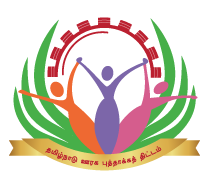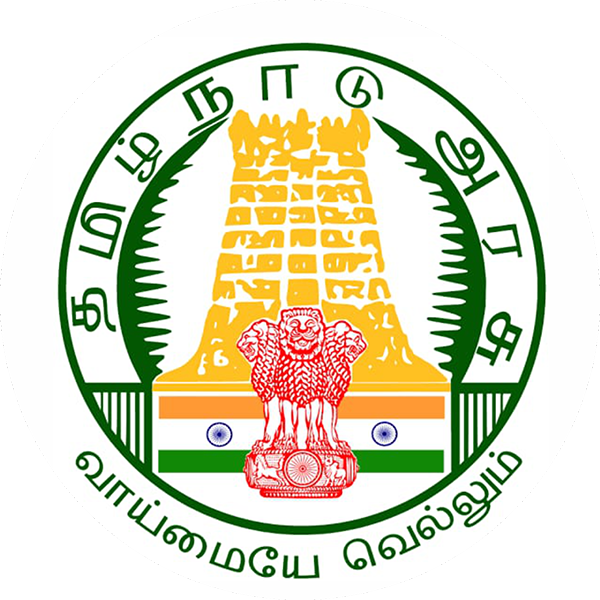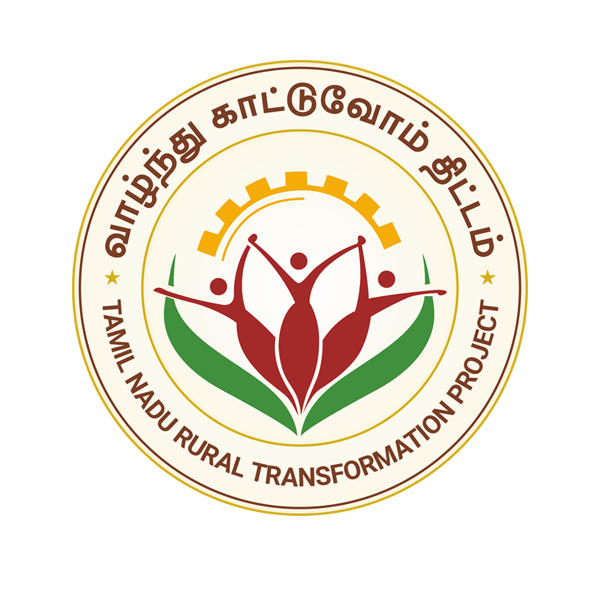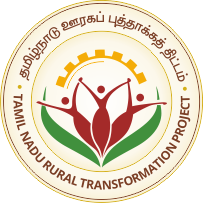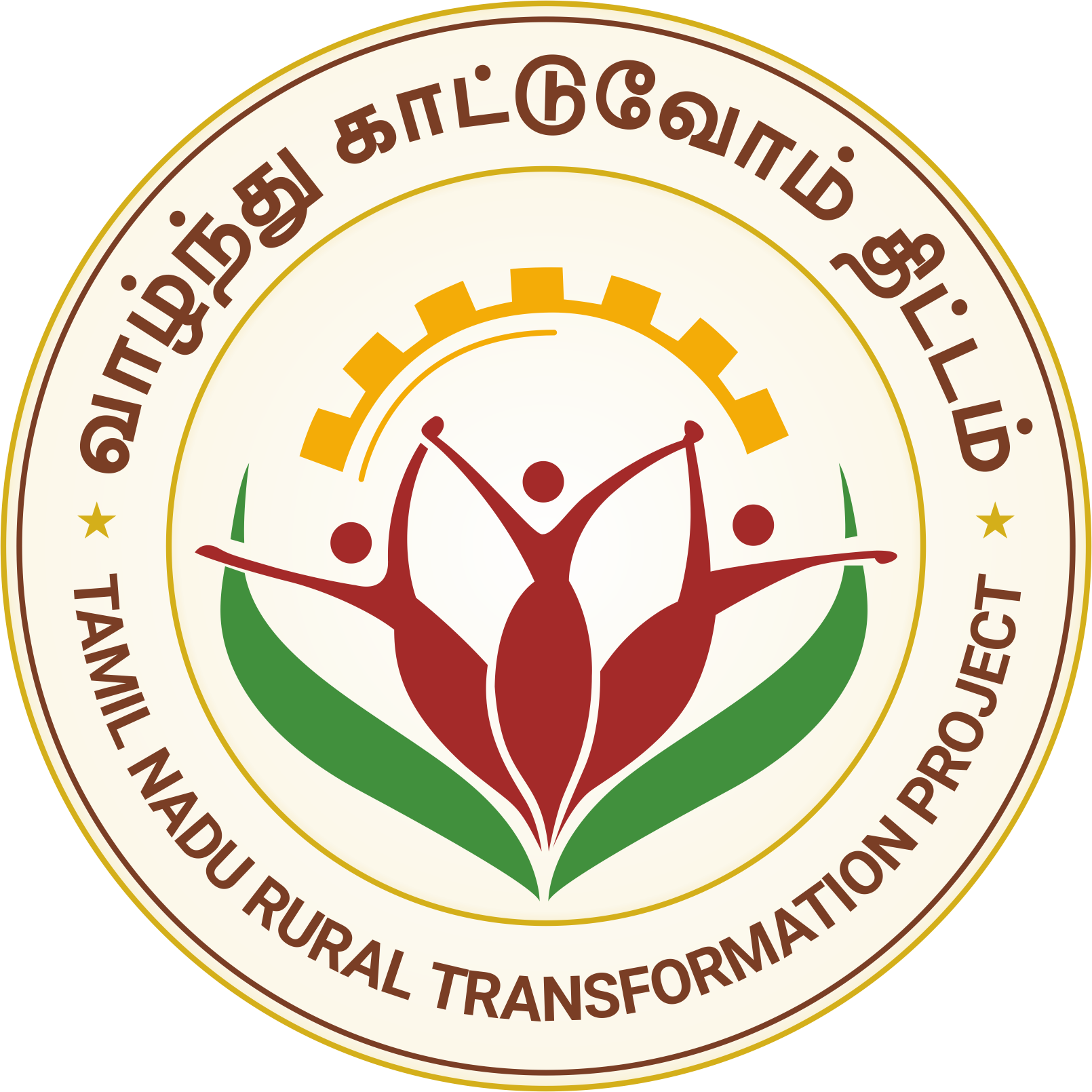Vazhndhu Kattuvom Project (VKP)
(Tamil Nadu Rural Transformation Project (TNRTP))
It is a project implemented with an objective of transforming the rural communities by creating sustainable development and prosperity through enterprise promotion, access to finance and employment opportunities. It is funded by World Bank and Tamil Nadu State Government in the ratio of 70:30.
Project Development Objective
The Project Development Objective (PDO) of VKP (TNRTP) is “to promote rural enterprises, access to finance, and create employment opportunities” in selected blocks of Tamil Nadu.
Area of Operation
The Project is implemented in 3,994 village panchayats across 120 Blocks of 31 districts (except Chennai, Thanjavur, Ariyalur, Perambalur, Dharmapuri, Kanyakumari, Thirupathur) over a period of 6 years from 2017 to 2023.
Funding
The World Bank and the Government of Tamil Nadu are funding this Project in the ratio of 70:30 at an estimated cost of Rs.919.73 crores (142.8 million US$). The loan assistance from World Bank will be Rs.643.81 crores (100 million US$) and the assistance by Government of Tamil Nadu (GoTN) will be Rs.275.92 crores (42.8 million US$).
Organisational Structure
The Vazhndhu Kattuvom Project (Tamil Nadu Rural Transformation Society (TNRTS)) has been formed and registered under the Tamil Nadu Societies Registration Act 1975. The Project management and implementation is governed and guided by the TNRTS, formed under the Department of Rural Development and Panchayat Raj, Government of Tamil Nadu. At the district level, the District Rural Transformation Societies (District Society) were formed under the Chairmanship of District Collector, to guide and facilitate the implementation of the project. The Governing Body (GB) and Executive Committee (EC) of the TNRTS will provide guidance on policy level decisions, coordination and direction to the State Project Management Unit team. The Project is being implemented through the state, district and block level Project Management Units.
- The SPMU is headed by the Chief Executive Officer (CEO), an IAS officer on deputation who directly monitors the implementation of the project, supported by the team of officers to implement, monitor and supervise the project.
- There are 24 DPMUs functioning as implementation units at present. The District Executive Officer (DEO), heading the unit is supported by 4 Executive Officers for monitoring the progress of the Project.
- The Block Management Unit has been established in 120 blocks across 31 districts headed by a block team leader supported by a team of 3 Project
Beneficiaries of the Project
The Project focuses on target population of SHG women, SHG households, scheduled tribes, scheduled castes, youth and differently abled persons. The beneficiaries will be producer households across farm and non- farm sectors in selected project blocks (producer groups, producer collectives and entrepreneurs in the project area).
The Project intends to create nano, micro and small entrepreneurs both individually and groups in the project area and to form Producer Groups (PGs), Enterprise groups (EGs) and Producer Collectives (PCs) to nurture and promote rural enterprises. The project will also support skilling through Community Skill Schools (CSS) and Community Farm Schools (CFS).
Major Components of the Project
This Project comprises of the following four major components:
- Rural Enterprise Ecosystem Development
- Enterprise Business Plan Financing
- Skills and Job Opportunities
- Project Management, Results Monitoring & Evaluation
Environment and Social Management Framework (ESMF), Gender Parity, Information, Communication & Technology, Partnership and Convergence are the cross cuttings of the entire project.
1. Rural Enterprise Ecosystem Development
The prime objective of this component is to create an enabling environment for promotion and strengthening of new and existing enterprises and to generate employment. This includes District Diagnostic Study (DDS), Value Chain Analysis (VCA), Participatory Growth Plan (PGP) and One Stop Facility Centers (OSF) etc.,
Identification of potential enterprises through participatory methods for promotion of rural enterprises (group and individuals), strengthening of existing rural enterprises, identifying markets and value chain development opportunities, providing business development support services and informed pathways to develop sustainable business are important activities in this component. The focus is on promoting women-led enterprises and green enterprises.
Inclusive Strategic Investment Analytics and Planning
- District Diagnostic Study (DDS)
The objective of the District Diagnostic Study (DDS) is to identify and prioritize major sectors/sub sectors and commodities for enterprise promotion in the local context. DDS is the first level of analytics based on stakeholder consultations and analysis of secondary information. This includes in-depth evaluation of the district for identifying the opportunities and challenges in specific sectors, sub sectors and commodities for next level of analytics through value chain approach.
This DDS reports have been prepared and approved by the District Committee headed by the District Collectors of the respective districts.
ii. Value Chain Analysis (VCA)
Value Chain Analysis is done to deep dive in the prioritized commodities/ sub sectors (identified through DDS) and obtain better understanding on the opportunities, challenges and risks in order to develop strategies for enterprise promotion with specific focus on women, persons from tribal communities and differently abled. This study helps to provide an analytical insight into market opportunities, constraints and thereby helps to arrive at appropriate interventions and investments for enterprise promotion.
iii. Participatory Growth Plan (PGP)
Participatory Growth Plan is a method to develop inclusive investment plans at village, block and district levels for enterprise promotion and for the development of rural communities through focused group discussion with the community members, producers, youth, and entrepreneurs. The Participatory Growth Plan exercise was facilitated by Village Poverty Reduction Committees.
Field survey has been undertaken in all 3,994 village panchayats by a team of 6 members comprising of 2 Community Professionals, 1 Self Help Group member, 1 Village Poverty Reduction Committee member, 1 Panchayat Level Federation member and 1 village entrepreneur. Survey data have been logged into an exclusively developed Mobile App. The result of the survey conducted as a part of Participatory Growth Plan exercise have led to drafting of Village Investment Plans (VIP). These Village Investment Plans have been compiled to form Block Investment Plan (BIP) and in turn the District Investment Plans have been developed by integrating these BIPs.
Enterprise Development Support Services
- Service Delivery through Panchayat Level Federation (PLF)
Self Help Group members who are experienced in community mobilization and have developed service delivery skills will be identified and retained as “Community Professionals (CP)” in various themes such as Jobs, Enterprises. The major objective of the CPs is to mobilize, promote and build individual and collective enterprises and skilling.
Identification, onboarding and monitoring of Enterprise Community Professionals (ECP) will be done through Panchayat Level Federation.
ii. One Stop Facility centers (OSF)
One Stop Facility center is a single point facility which provides business development support services viz., business plan preparation and appraisal, support services to initiate the business, such as finance, technology, skills, regulation & compliances, market information, linkages etc., to rural entrepreneurs. One OSF will be established for every 3 contiguous blocks.
Enterprise Promotion, Value Chain Strengthening and Partnerships
- Individual Enterprises
Individual Enterprise is an enterprise owned by an individual or more than one individual in partnership. Individual enterprises are classified as nano, micro and small enterprises. The enterprises whose investments upto 5 lakhs are called nano enterprises, and investments 5 to 15 lakhs are called micro enterprises and investments 15 to 30 lakhs are called small enterprises.
The project aims to identify 6000 nano, 500 micro, 120 small individual enterprises and provide them technical guidance, training, financial services and other such services required by the entrepreneurs.
ii. Group Enterprises
Through this project, Producer Groups, Enterprise Groups and Producer Collectives will be formed.
a) Producer Groups (PG)
Producer Group is a group of producers engaged in a particular commodity/ subsector in a village who come together for aggregation, productivity enhancement, and other collective actions leading to increased income profit to the members. These groups have a membership range of 30 to 150. For this current year 2021-22, the target of 2,000 Producer Groups will be formed.
b) Enterprise Groups (EG)
An Enterprise Group is a group of members having joint ownership and control over the business activities with shared profit and loss. These groups will have a membership range of 10 to 30 as a legally registered body (under MSME Registration/ Partnership Firm /Limited Liability Firm).
The purpose of an enterprise group is to reduce production costs, improve quality and increase the revenue and margin through joint venture. For this current year 2021-22, a target of 500 enterprise groups will be formed.
c) Producer Collective (PC)
Producer Collective (PC) is a formal higher-level collective of producers for aggregation, value addition, marketing and service provisioning for economies of scale. The membership is usually ranging between 300 – 3,000 producers. The producer groups which are formed at the village level will be federated in the form of producer collective at block/district levels. The producer collectives will be legally registered bodies. The producer collectives will leverage scale of economy such as engage in aggregation, quality input supply, higher order value addition like primary & secondary processing, branding and marketing. For the current year 2021-22, a target of 25 Producer collectives will be formed.
2. Enterprise Business Plan financing
Access to finance for business plans of individual and group enterprises through Matching Grant Program (MGP) and other financial services by formal financial institutions is an important aspect of VKP (TNRTP)
Matching Grant Program
Matching Grant Program (MGP) intends to incentivize the repayment of borrowers and generate momentum amongst the financial institutions to lend to the individual and collective. Matching Grant will be available to the borrowers together with the loans sanctioned by the PFI (Partnering Financial Institutions). On prompt repayment of 70% of the loan amount, the borrower is eligible for 30% waiver. This facilitates the entrepreneurs/groups to fully concentrate in their enterprise to run it profitably and to repay the loan promptly.
Matching grants would be intended for first time entrepreneurs, women led businesses, enterprise groups, producer collectives, Differently abled led enterprises and other types of enterprises perceived as a challenge by the financial sector.
Innovative Pilot Projects – VKP (TNRTP) will pilot certain innovative projects like
- Creative industries in the fields of weaving, pottery, and other creative enterprises to support rural artisans.
- Agri food hub facility – especially native and traditional food to promote culinary sector.
- Green enterprises such as solar power based activities and bio- degradable products towards environment protection and energy
Nano Enterprising Financing Fund (NEFF):
Project has implemented Covid-19 Assistance Package (CAP) through which 88,349 enterprises were given loan assistance to tune of Rs.259.78 crores through VPRCs and PLFs. The loan given to individual enterprises under CAP initiative is being repaid and this fund will be channelized as a Nano Enterprise Financing Fund. It is to create an inclusive business environment for supporting new and existing enterprises operated by the SHG member / SHG households, Differently abled and Vulnerable. The Proposed Nano Enterprise Financing Fund (NEFF) will follow the principles of the lending pathways of the existing Community Based Organizations (CBOs) like PLFs and VPRCs mechanisms in selection of entrepreneurs, assessment, documentation and release of funds.
entation and release of funds.
3. Skills and Jobs
VKP (TNRTP) aims to create sustainable wage and self-employment opportunities, promote relevant skills for higher value agriculture and allied activities and enable entrepreneurship through market responsive skills and entrepreneurship development.
Pre and Post Training Services to Enhance Employment Outcomes
Activities such as identification of target youth, mobilisation for skill training, counselling and other pre and post training services shall be provided to aspiring youth.
Migration Support Centre
Skilled rural youth often have to migrate to fulfil their career aspirations, earn more income and for better career growth. Often they find it difficult to cope with the high cost of living, socio-economic demands of the city, resulting in poor job retention, unfulfilled aspirations and inability to integrate with the mainstream labour market.
Migration Support Centre (MSC) is a novel concept with objective of providing a host of services to migrants from targeted 120 blocks. Migration Support Centre (MSC) facilitates the migrants in accessing better services, monitors post placement progress of youth, provide key information on health, education and remittance services.
VKP (TNRTP) proposes to setup MSCs in collaboration with stakeholders which are implementing skill training programmes, Community Based Organisations, industries, industrial associations, etc. This collaboration will not only be helpful in setting up the MSCs but also ensure sustainability in long run.
Project has planned to set up Migration Support Centres in five Districts which has high potential for job and employment opportunities.
Community Based training and Skilling Provision
Community Skill Schools (CSS)
Among rural communities there is a high demand for certain traditional and highly remunerative skills such as weaving, metal works, paintings, pottery, basket, mat making etc.,
Expert practitioners available in the locality who are proficient in the practising trade and keen to impart knowledge to the community will be identified as trainers. These trainers will be facilitated to set up community skill schools with simple and minimum required infrastructure to train the interested local people so as to revive these ancient arts and ensure creation of job opportunities and enterprise promotion.
Apart from traditional skill trainers, experts in certain high demand services including two / four wheeler mechanic service, home appliance service, masonry, plumbing, welding, electrician, mobile repair, IT enabled (Computer) services etc., will also be identified and they will be facilitated to train the communities under Community Skill Schools to create more job opportunities and rural enterprises. For the current year 2021-22, 18,000 rural youth will be trained in the Community Skill Schools (CSS).
ii. Community Farm Schools (CFS)
The Project seeks to develop a cadre of technical service providers Skilful Personal ability Attitude Resourceful and Knowledgeable (SPARKs) in agriculture and allied sub sectors who will, in turn build skills among the community members through setting up of Community Farm Schools (CFS).
SPARK is a community expert practitioner who has knowledge, skills, attitude and rich experience in a particular farm activity. They possess interest and keenness to share their expertise and train community members on required technical skills at village or block level.
Project will identify such individuals and engage them as SPARKs to mentor, teach, train, guide and handhold other individual practitioners of similar activity in community farm schools.
The CFS will identify specific skill gaps in farm and off-farm related occupation and bring in required technical expertise for solutions and identify and train SPARKS to deliver these suitable technological support to the community. The CFS will work with the individual and group enterprises promoted by the project for better synergy. For the current year 2021-22, 60,000 Producer Group members will be given training in Farm and Animal husbandry activities under Community Farm Schools (CFS).
4. Project Management, Results Monitoring & Evaluation
For effective implementation of VKP(TNRTP), there has to be a robust management and monitoring systems, create delivery processes for Financial Management, Procurement Management, Human Resource Management, Social, Environmental and Tribal safeguards and Information Communication Technology (ICT).
Monitoring and Evaluation
Monitoring and Evaluation (M&E) is a continuous activity to generate feedback on the performance of the project activities and support project managers to take timely corrective measures to address any shortcomings and deviations. M&E system will provide realistic, real time and easily understandable information on various aspects of project implementation.
Creation of Digital Platform
Information, Communication and Technology (ICT) is an inevitable part of the Project to establish a digital platform for the real time monitoring of the project activities and their efficient functioning. VKP (TNRTP) is in the process of developing, designing and implementing the software application for this project.
This application will stabilize and strengthen the Management Information System (MIS) of the Project and serve as a ready reckoner for all the data related to the VKP (TNRTP) Project.
